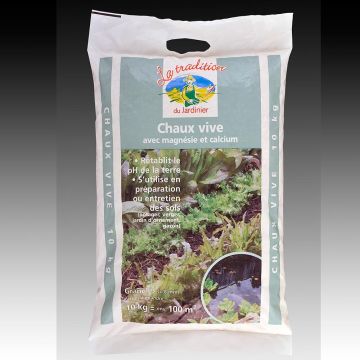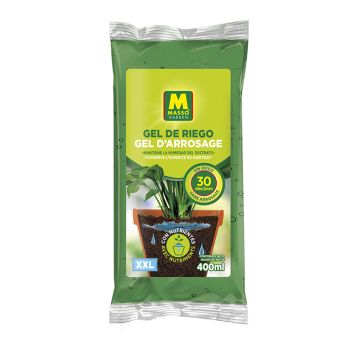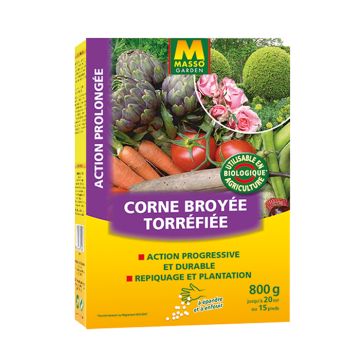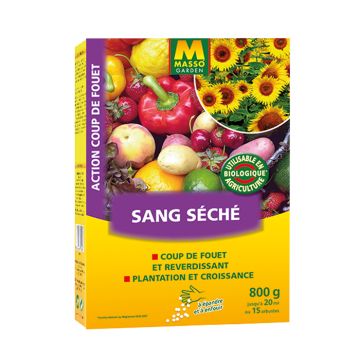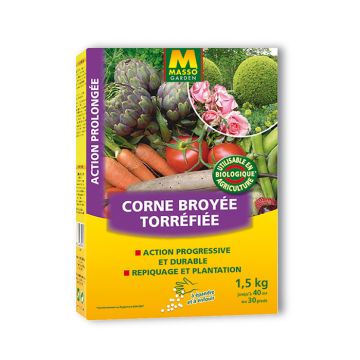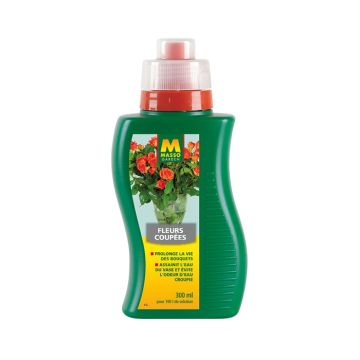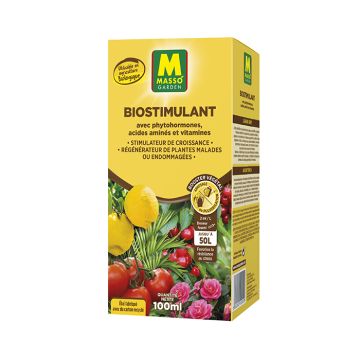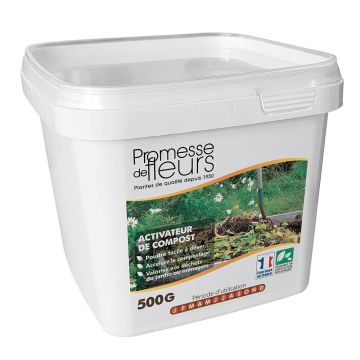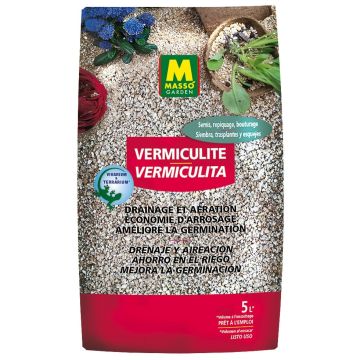

Lithothamne "Maërl" - Seaweed amendment - Masso
Lithothamne Maërl - Seaweed amendment - Masso
This item cannot be shipped to the selected country
Delivery charge from €5.90
More information
Schedule delivery date,
and select date in basket
We guarantee the quality of our plants for a full growing cycle, and will replace at our expense any plant that fails to recover under normal climatic and planting conditions.
From €5.90 for pickup delivery and €6.90 for home delivery
Express home delivery from €8.90.

The Lithothamne "Maërl" seaweed from Masso Garden is both a corrector and an amendment designed to correct the deficiencies of very acidic soils, which are not favourable to many vegetables or flowers. It is a 100% natural product made from dried calcareous marine algae. It is used to correct deficiencies in calcium, magnesium, and trace elements, to reactivate the soil's microbial life, and to raise the pH. Suitable for all plants, except acid-lovers and heathland plants, this amendment is also known to limit moss proliferation in lawns. It is usable in organic farming. Easy to spread lithothamne diffuses into the soil through watering and rainfall.
Lithothamne is composed of a calcareous red algae called Lithothamnium calcareum that grows offshore in depth off the coast of Brittany. This algae is sought after for its richness in calcium, magnesium, and marine trace elements such as iron and manganese. Once dried, it is reduced to a fine powder. Sometimes used as a dietary supplement, it is valuable in the garden. As an acid pH corrector, lithothamne also acts as a "boost" organic fertiliser, quickly absorbed by crops. It can be used in vegetable gardens, ornamental gardens, orchards, and on lawns.
Dosage:
- At planting: 40 to 50 g/m²
- For maintenance: 20 to 30 g/m²
- pH correction: 50 to 60 g/m²
Technical characteristics: 45% calcium oxide (CaO), 5% magnesium oxide (MgO), + 32 trace elements. Grinding fineness: 100% to 160 microns. Neutralising value (VN): 52. Carbonic solubility: 80.
Usage: from September to February.
The role of calcium in the soil:
Limestone has a beneficial effect on soil structure, helping to maintain or improve its stability by acting as a binder between clay particles and humus. Other elements such as magnesium also have this ability. In the garden, soil well supplied with Ca2+ ions will have a crumbly structure, permeable to water and air, and aggregates that are more resistant to leaching caused by rainfall. It should be noted that organisms living in the soil are sensitive to pH variations and that it is necessary to avoid raising it too abruptly. Calcium deficiencies are rare in most cultivated soils and mainly affect acidic and very low pH (<5.5) environments. In this case, the naturally occurring aluminium becomes soluble in the soil solution and can be absorbed by the plant, which can cause damage to certain crops.
The role of calcium in plants:
Calcium (Ca) is one of the essential nutrients for plants. Taken up by the roots, it contributes to the development of plant cell walls, making them rigid, activates various enzymes involved in foliar metabolism, and promotes the growth of young roots in synergy with other elements.
Do not overdose - Use only when necessary.
BASIC MINERAL AMENDMENT NFU 42-001 LITHOTHAMNE OR "MAËRL" CALIBRATED, PULVERIZED 100% OF MARINE ORIGIN. Product usable in organic farming in accordance with EC regulations 834/2007 and 889/2008.
Technical features

Detailed features
Tips
Tips
Other Soil Improver for Vegetable and Ornamental Gardens
This item has not been reviewed yet - be the first to leave a review about it.
Soil Amendments
Haven't found what you were looking for?
Hardiness is the lowest winter temperature a plant can endure without suffering serious damage or even dying. However, hardiness is affected by location (a sheltered area, such as a patio), protection (winter cover) and soil type (hardiness is improved by well-drained soil).

Photo Sharing Terms & Conditions
In order to encourage gardeners to interact and share their experiences, Promesse de fleurs offers various media enabling content to be uploaded onto its Site - in particular via the ‘Photo sharing’ module.
The User agrees to refrain from:
- Posting any content that is illegal, prejudicial, insulting, racist, inciteful to hatred, revisionist, contrary to public decency, that infringes on privacy or on the privacy rights of third parties, in particular the publicity rights of persons and goods, intellectual property rights, or the right to privacy.
- Submitting content on behalf of a third party;
- Impersonate the identity of a third party and/or publish any personal information about a third party;
In general, the User undertakes to refrain from any unethical behaviour.
All Content (in particular text, comments, files, images, photos, videos, creative works, etc.), which may be subject to property or intellectual property rights, image or other private rights, shall remain the property of the User, subject to the limited rights granted by the terms of the licence granted by Promesse de fleurs as stated below. Users are at liberty to publish or not to publish such Content on the Site, notably via the ‘Photo Sharing’ facility, and accept that this Content shall be made public and freely accessible, notably on the Internet.
Users further acknowledge, undertake to have ,and guarantee that they hold all necessary rights and permissions to publish such material on the Site, in particular with regard to the legislation in force pertaining to any privacy, property, intellectual property, image, or contractual rights, or rights of any other nature. By publishing such Content on the Site, Users acknowledge accepting full liability as publishers of the Content within the meaning of the law, and grant Promesse de fleurs, free of charge, an inclusive, worldwide licence for the said Content for the entire duration of its publication, including all reproduction, representation, up/downloading, displaying, performing, transmission, and storage rights.
Users also grant permission for their name to be linked to the Content and accept that this link may not always be made available.
By engaging in posting material, Users consent to their Content becoming automatically accessible on the Internet, in particular on other sites and/or blogs and/or web pages of the Promesse de fleurs site, including in particular social pages and the Promesse de fleurs catalogue.
Users may secure the removal of entrusted content free of charge by issuing a simple request via our contact form.
The flowering period indicated on our website applies to countries and regions located in USDA zone 8 (France, the United Kingdom, Ireland, the Netherlands, etc.)
It will vary according to where you live:
- In zones 9 to 10 (Italy, Spain, Greece, etc.), flowering will occur about 2 to 4 weeks earlier.
- In zones 6 to 7 (Germany, Poland, Slovenia, and lower mountainous regions), flowering will be delayed by 2 to 3 weeks.
- In zone 5 (Central Europe, Scandinavia), blooming will be delayed by 3 to 5 weeks.
In temperate climates, pruning of spring-flowering shrubs (forsythia, spireas, etc.) should be done just after flowering.
Pruning of summer-flowering shrubs (Indian Lilac, Perovskia, etc.) can be done in winter or spring.
In cold regions as well as with frost-sensitive plants, avoid pruning too early when severe frosts may still occur.
The planting period indicated on our website applies to countries and regions located in USDA zone 8 (France, United Kingdom, Ireland, Netherlands).
It will vary according to where you live:
- In Mediterranean zones (Marseille, Madrid, Milan, etc.), autumn and winter are the best planting periods.
- In continental zones (Strasbourg, Munich, Vienna, etc.), delay planting by 2 to 3 weeks in spring and bring it forward by 2 to 4 weeks in autumn.
- In mountainous regions (the Alps, Pyrenees, Carpathians, etc.), it is best to plant in late spring (May-June) or late summer (August-September).
The harvesting period indicated on our website applies to countries and regions in USDA zone 8 (France, England, Ireland, the Netherlands).
In colder areas (Scandinavia, Poland, Austria...) fruit and vegetable harvests are likely to be delayed by 3-4 weeks.
In warmer areas (Italy, Spain, Greece, etc.), harvesting will probably take place earlier, depending on weather conditions.
The sowing periods indicated on our website apply to countries and regions within USDA Zone 8 (France, UK, Ireland, Netherlands).
In colder areas (Scandinavia, Poland, Austria...), delay any outdoor sowing by 3-4 weeks, or sow under glass.
In warmer climes (Italy, Spain, Greece, etc.), bring outdoor sowing forward by a few weeks.

































